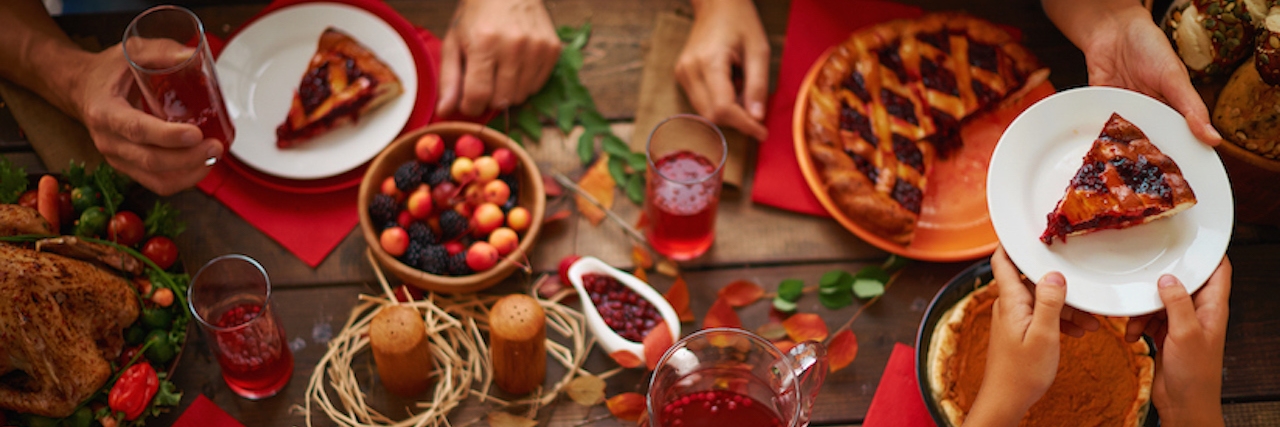Don’t get me wrong, I’m a grateful person all year, and while I respect the Thanksgiving holiday and traditions, I dread the upcoming event like a gynecology appointment. It may be good for me, but it’s awkward and uncomfortable.
Though individuals with sensory processing disorder (SPD) have extremely different aversions, I’ll list mine below. Some seekers may crave all of the things I detest. We are all that different, so be mindful of your sensory kiddo, whatever their sensory needs may be.
Thanksgiving can suck when you have SPD.
My sensory systems are wonky. Crowds cause me anxiety in general, even when it’s a crowd of friends and family. I have a hard time bouncing around in groups, and I find it draining. Exhausting, really. My internal temperature skyrockets, making me sweat like a snowman in the sun, and I never seem to be dressed right (I’m either too summery and cold or too wintery and hot).
The noise level at Thanksgiving is the worst.
I can’t tune out sounds, so it’s hard for me to make small talk with old aunt June while the TV is blaring football in the background. I have to really concentrate, look at lips and try to focus on what someone is saying to me, while all I hear is the football announcers’ play-by-play. Or I can hear a set of cousins whispering to each other about a boy they like on the other side of the room. And the sink dripping in the kitchen. And the video game Little Johnny is playing on the couch. I hear it all.
The millions of scents in a crowded space kill me!
While I love the smell of a grand Thanksgiving meal cooking, it’s often overpowered by perfumes, colognes and body odor. Ladies, I get it, you want to smell nice, but think about how many fragrances you’re adorning. Perfume, shampoo, lotion, hair gel and hairspray to name a few. Add the fragrance from your laundry detergent and the hand sanitizer and you’re just a rainbow of scents, which people like me find revolting. Not you! But the scents…
Food textures at Thanksgiving can make me gag.
I know food texture aversions can happen anywhere and anytime, but it’s guaranteed to happen to me during traditional American Thanksgiving meals. Cranberries from a can have always grossed me out with their slimy texture. Even looking at it can give me the creeps. Celery’s potent odor and texture ruins stuffing for me. Boxed mashed potatoes are gritty, and real mashed potatoes are too clumpy unless they’re blended. It’s just best if I’m in control of what’s going into my mouth.
I find most turkey to be dry and tasteless without drowning it in gravy. See, it’s a oral dilemma before I’m even in the door. And not to digress, but as you can guess, I can’t handle the sound of people chewing. Smacking. Slurping. And there’s a name for that — misophonia! You or your child may have this, too.
Other Thanksgiving situations that may irritate people with SPD:
- Temperature. Is it hot in the house and cold outside?
- Is everyone talking at once? This creates noise confusion.
- Are people talking with their mouths full? Loud chewing and smacking can be torturous.
- Take note if there is a lot of clinking of silverware on plates, which can be an acoustic nightmare.
- Hugging, bumping into each other, crowding. Is there no personal space?
So what is a parent of a child with SPD to do?
Take sensory breaks. If your child needs to have some time alone, take them in a separate room or outside for a walk. If you’re in your own home, make their bedroom a sensory den they can escape to if needed. If you’re going to a family member’s home, see if they have a space you can use when needed.
Either go early so they can acclimate, or just attend the festivities for a short time.
Bring comfort items for your child, such as a bean bag, noise cancellation headphones, an iPad. You know what helps your child regulate.
Talk about their needs. When a child is able to articulate that they’re feeling out-of-sorts, it can help to have a caring parent hold their hand or give them some deep pressure shoulder squeezes to help calm.
Create boundaries. Sometimes your child is a seeker and is the one bumping into everyone and getting in their space. Provide proprioceptive and vestibular input before arriving — such as mini-trampoline, jumping onto a crash pad, bear walks, jumping jacks, etc. — to help them regulate before arriving. If your child is more of an avoider, protect their space at times and provide creative activities that the kids can do without being all over each other.
Regardless of my own personal sensory processing issues, I’m able to enjoy Thanksgiving once I get over the anxiety of the expected annual events. I can usually find a room or place to hang out away from the football noise, and enjoy time with family and friends. And I can control my environment, or I can leave. Hooray for being an adult!
So, while I encourage parents to be aware of why Thanksgiving can suck for those with SPD, it doesn’t have to.
Follow this journey on Peace Autism and Love.
The Mighty is asking the following: What’s one thing people might not know about your experience with disability, disease or illness during the holiday season, and what would you say to teach them? If you’d like to participate, please send a blog post to community@themighty.com. Please include a photo for the piece, a photo of yourself and 1-2 sentence bio. Check out our Share Your Story page for more about our submission guidelines.
Lead photo source: Thinkstock Images

